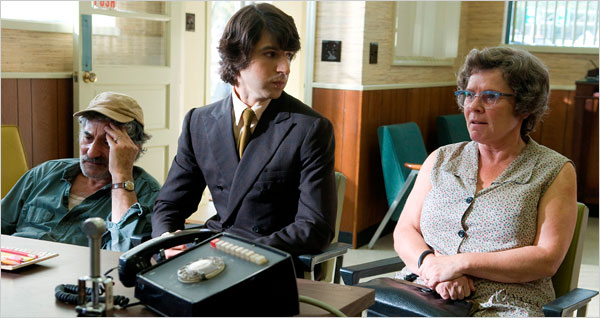Taking Woodstock

“Max Yasgur’s Farm” are mythical words evoking myriad images. Michael Lang (Jonathan Groff vaguely resembling Andy Samberg in Robert Plant’s wardrobe), John Roberts (Skylar Astin), Joel Rosenman (Daniel Eric Gold) and Artie Kornfeld (Adam Pally) may have formed the partnership, Woodstock Ventures, Ltd., which conceived of this (intended) moneymaking scheme, but the young Elliot Teichberg (Demetri Martin) allegedly negotiated access to Yasgur’s pastures. Billed as the Woodstock Music Art & Fair, originally set in Wallkill, festival promoters relocated the event to White Lake in Bethel, NY—actually 43 miles (69 kilometers, just to arouse suspicions of cosmic significance) southwest of Woodstock.
Directed by Ang Lee, screenplay by James Schamus, Taking Woodstock was adapted from Elliot Teichberg’s (now Tiber) 2007 memoir of his experiences running the El Monaco Motel in White Lake in the summer of 1969 when the nascent cultural phenomenon took root. The Teichbergs, Sonia (Imelda Staunton, a bespectacled pasquinade of a Jewish matriarch) and Jake (Henry Goodman, at times channeling Judd Hirsch—good or bad? You decide.), fight to keep their property, now $5000 behind on their mortgage. This vantage point, while historically accurate, is cliché for a film endeavoring to enlighten us of portentious events which almost werent.
The narrative shifts direction repeatedly between the event promoters, Elliot and his overbearing mother and conflicted father, the townspeople peculiarly split over the influx of thousands of hippies (“Robbin’ us by day and rapin’ the cattle at night,” protests one fatuous fellow), the entrepreneurial Yasgur (Eugene Levy) who ups his demand to $75,000 yet, explicating Schamus’ terribly self-aware screenwriting, presciently muses the audacity of charging $1 for a bottle of water. I hear during one of the Woodstock revival concerts in the 1990’s they charged about $4 a bottle—keeping near perfect time with inflation.
Let’s not forget the 500,000 music lovers, peaceniks, hippies, and other introspectively minded citizens of the Flower Power generation. Except the film abandons character development, preoccupied with hurrying through the many themes. While we are informed he’s a good kid, defying rebellious spirit having breakfast with his parents, we don’t understand what makes Elliot who he is. The film bandies bisexual and homosexual encounters of Elliot’s for dramatic effect and titillation, yet fails to ruminate his psyche. Nor does the film ever bother to explain that Wallkill, NY, yanked the cord briefly after the Stonewall Riots or that, as stated in Tiber’s memoir, Elliot was there. Perhaps these facts may be in dispute, as is Elliot’s actual involvement in the introduction of the promoters to Yasgur. But if you’re going to take poetic license anyway, why not discuss Stonewall and the indelible influence it had on your protagonist?
Certainly, the film languishes in story development: a CG-created LSD trip—the most cinematically-fantastic, and excessively lengthy, representation since perhaps Dave Bowman’s interstellar freak-out in 2001: A Space Odyssey, a solemn pause while ma and pa are watching the Apollo 11 landing, and Vilma (Liev Schreiber) the delightfully-honest drag queen of whom we see little except when mystical (read: intellectually bankrupt) aphorisms require injection into this schmaltzy trip down memory lane.
Two other critical, yet unfinished characters appear: First, Billy (Emile Hirsch as the love child of Jack Black and Charles Manson), the PTSD-afflicted war veteran. Billy is a Jungian goldmine to explore the depths of pain that defined the other side of post-Kennedy America, yet Mr. Lee and Mr. Schamus ruin it by turning a poignant flashback dialogue into the setup for a gag. Second, Michael Lang’s every wink and smile clearly stirs Elliot. Oh, how devoid of substance Michael is as the hot, young liaison between financiers Mr. Roberts and Mr. Rosenman, the Teichbergs and Mr. Yasgur. “Everybody’s gonna chase the money. We’re all probably gonna sue each other,” says Mike. And that’s probably very true. But we don’t get much out of Mr. Lang beyond the shallow artifice underlying his pixie grin.
Is it useful, perhaps, to know that Woodstock itself was born as a bona-fide moneymaking scheme? It is an historical fact that the promoters advertised in the New York Times and the Wall Street Journal, “Young men with unlimited capital looking for interesting, legitimate investment opportunities and business propositions.” There’s the rub—an interesting dichotomy the film skirts but fails to elaborate upon.
Earlier today I was reading an April editorial in Newsweek, titled “Generation Me” by Raina Kelley. Ms. Kelley argues that the rebellion of the 60’s created a generation of parents
who, maybe well-intentioned, gave their children too much rope, with which those children are now strangling past virtues—e.g. respect for intellect and experience, mistaken for authority and fascism. We could also aptly name them “The Entitlement Generation.” Watch carefully as the film tries to ramrod too many themes, invoking split-screen technique, and see if you can identify how often self-indulgence is confused for enlightenment.
While my parents are from that same generation, we were born in India and raised in a different, Hindu, culture retaining different values imported with us to America. I feel the hippies failed to grasp that the Hindu philosophy of detachment is not egocentric. It’s about discovering one’s own insigificance in the universe. During the brief Apollo 11 telecast scene, the audience instantly fell mute in reverence. I wonder, did anyone ponder how June 20, 1969, differed materially from Woodstock? Despite its political catalyst, the Cold War, for those involved the moonshot summoned the accumulation of millennia of human experience and knowledge to manifest our ultimate aspiration to transcend outer, not inner, boundaries, bearing cosmic implications for all humanity and posterity.
 Taking Woodstock • Dolby® Digital surround sound in select theatres • Aspect Ratio: 1.85:1 • Running Time: 110 Minutes • MPAA Rating:R for graphic nudity, some sexual content, drug use and language. • Distributed by Focus Features
Taking Woodstock • Dolby® Digital surround sound in select theatres • Aspect Ratio: 1.85:1 • Running Time: 110 Minutes • MPAA Rating:R for graphic nudity, some sexual content, drug use and language. • Distributed by Focus Features